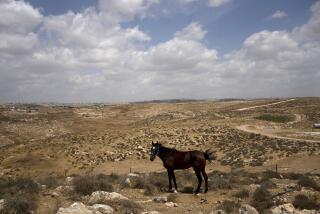In Morale Boost to Settlers, Netanyahu Visits West Bank
ELI, Israeli-Occupied West Bank â Prime Minister Benjamin Netanyahu gave a morale boost to Jewish settlers Tuesday, making his first visit to their communities since taking office and vowing further Israeli expansion in the contested lands.
For the 250 families of Eli, the first visit by an Israeli prime minister to their hilltop settlement deep in the disputed West Bank was a welcome change. Kindergartners greeted Netanyahuâs helicopter arrival by waving Israeli flags, and yeshiva students locked arms to dance and sing passages from Psalms.
âThe dry spell is over,â Netanyahu told the cheering students.
Eli resident Dan Polisar said the prime ministerâs trip so far beyond the so-called Green Line--Israelâs pre-1967 border--would be noticed by all of the nearly 150,000 West Bank and Gaza Strip settlers. Netanyahu also visited the larger, nearby Jewish settlement of Ariel.
âHe is saying, âI view you as part of Israel,â â Polisar said. âFor years, we had the sense we were on the outs.â
Predecessor Labor Party governments allowed settlement expansion and built a web of roads for settlers throughout the West Bank. But the late Prime Minister Yitzhak Rabin halted government funding of the housing construction and expressed disdain for the settlers during his tenure, which was cut short a year ago by a Jewish assassin opposed to his agreement to trade land for peace with the Palestinians. Much of the West Bank is now under Palestinian rule.
Furthermore, Rabin and his successor, Shimon Peres, had indicated a willingness to evacuate remote settlements such as Eli that were not considered vital to Israelâs security in a final peace agreement with the Palestinians.
The Likud Partyâs Netanyahu, who narrowly beat Peres in national elections in May, has embraced the settlers. His hard-line government has announced the sale of 3,000 West Bank apartments that the Labor governments had frozen during negotiations with the Palestinians and has approved the construction of 1,200 units.
In Washington on Tuesday, the Clinton administration delivered its sharpest attack yet on the settlement policy of Israelâs Likud government. State Department spokesman Nicholas Burns said Netanyahuâs trip to the West Bank outposts was ânot useful and not constructive.â
The Palestinian Authority sent Israel a letter Monday warning that Jewish settlement expansion is threatening peace negotiations. Palestinian negotiator Saeb Erekat said the letter cautioned that âcontinuation of such policies will bring both of our peoples back to the square of confrontation and disaster.â
The letter followed a daylong standoff Sunday between Israeli soldiers and Palestinian motorists near the Jewish settlement of Netzarim in the Gaza Strip. Reportedly at the urging of their police, Palestinians had jammed a mile-long strip of road in front of the settlement to protest Israeli travel restrictions in force there since a suicide attack by Islamic militants in 1994.
Israel sent tanks to the entrance of Netzarim and lined the road with soldiers and armored personnel carriers.
On Tuesday, Netanyahu and Palestinian Authority President Yasser Arafat traded accusations and warned each other again that threats of violence and military pressure would lead nowhere. âWe cannot build peace without stability,â Netanyahu said in Eli.
He told the residents that the battle for West Bank territory is not over. âMost of the land is still an open topic, practically and politically, and the big issues are still ahead of us,â he said.
Some in the audience were doubtful. Settler leaders have accused Netanyahu of moving too slowly. They say that while he has freed up some housing in settlements near the Green Line, he has done nothing to expand more remote enclaves such as Eli or to guarantee their future.
âHe said this is a new beginning,â Pinhas Wallerstein, head of the Council of Jewish Communities of Judea, Samaria and Gaza, said after the speech. âI believe in facts on the land. There are 250 families here. For me, success will be if in the next election [in four years] there are 600 families here.â
Netanyahu told residents that he expects final-status negotiations with the Palestinians to begin next year and that his proposal would give Palestinians autonomy but no sovereignty--much as they have now.
âI think this proposal will certainly allow the Palestinians to handle their own lives without our intervention but will leave in our hands the supra-authority over the issues of security,â he said.
The Palestinians reject this idea, demanding an independent state with East Jerusalem as its capital.
Rabbi Yoel Rechel said he isnât worried about final talks or the future of Eli. The settlement was founded by Likud in 1984, and construction starts were completed under Labor governments.
âFive years ago we were 28 families. Now look at us--itâs almost a city. And that was under Labor. So why should I worry?â he said.
More to Read
Sign up for Essential California
The most important California stories and recommendations in your inbox every morning.
You may occasionally receive promotional content from the Los Angeles Times.










